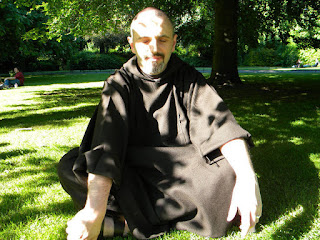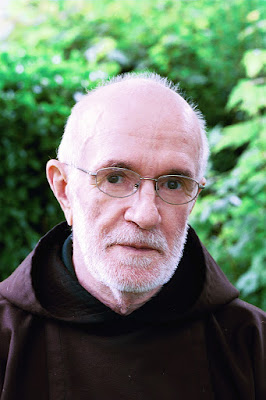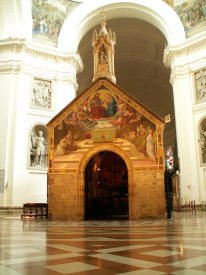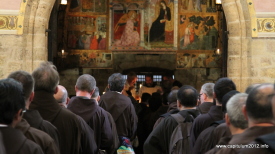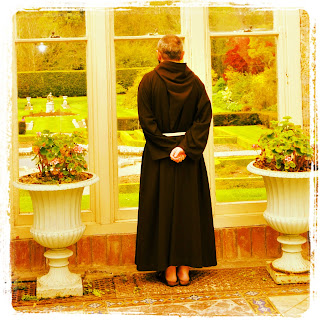Christmas Blessings to one and all!
Here is the sermon I gave at Midnight Mass at our friary last night...
May it bless you and yours. +
Brother Richard
Christmas Eve 2015 The Year of Mercy
Our God
bows low…
This is the
message of Christmas Night…
The One who
is the Lord of Lords, and the Light from Light from all eternity;
the One who
is the only begotten Son and the Eternal Word of the Father bows low…
Bows
because of us…
Bows before
us…
He bows so
low that He descends, emptying Himself of all that would keep Him separate from
us,
of all that
would make us feel unworthy, or lost, or shameful…
The awful
and terrible All-Holy presence in the Garden of Eden who sent Adam and Eve
hurrying to hide their fallen selves now hides Himself in our flesh.
The voice
of thunder upon the Mountain of Sinai that made all those who heard it throw
themselves on the ground in fear while they begged Moses to pray that they
would never hear it again is now heard in the cry and gurgle of new born baby.
The One
whose luminous glory filled the Temple
and whose reign transcends space and time chooses the deep rich darkness of a
woman’s womb and delivered into time is now swaddled against the night’s cold
and barely fills the manger He lies in…
Our God
bows low…
He has
descended to be with us, to seek us out.
He has
descended to raise us up…
The Word
became Flesh and dwelt amongst us…
Amongst us
sinners!
We who were
meant to be the joyous light filled pinnacle of creation but who had fallen to
the lowest place of darkness and despair, now find ourselves called out of
darkness and into His own wonderful light…
And His
light is not the proud light of glory, but the gentle glow of lantern in a
stable that is really only a little cave; just a crack in the earth that over
the ages will crack the hardest of hearts open if they just hear its call…
Our God
bows low…
He bows
down to raise us up,
He empties
Himself so that we may be filled,
He leaves
the 99 to seek the One who is lost.
He comes
not as conqueror or Lord, though He is truly both;
but only as
Shepherd, Healer, Teacher, Carpenter…
Child…
But we
forget…
we forget this
every year…
every day…
even,
perhaps, every moment…
We fail to
hear the cry of the newborn calling us to this new beginning and so we need our
Christmas celebration… and perhaps this year we need it like never before… we
need its reminder of the Love and mercy that is poured into our world. The
infinite Love and Mercy which sustains it and nourishes it and heals it and
renews it in every moment…
We need it
to call us to watch with the Shepherds and the Wise men for that glimmer of
light in the sky of our souls, for that song of the Angels that we stopped
singing a long time ago when we fell from the Eden of our innocence. It’s harmony has
always been there just at the edge of hearing, on the threshold of our dreams, resting
within our heart waiting to burst forth again and renew us with the light of
Christmas, the light of Christ Mass, the light of the Child of Bethlehem who
makes everything new and whose light the darkness can never overpower.
We seek
that light in every Christmas bulb kindled on tree or shop-front or street
corner, in every sparkle of tinsel or flame of hearth even when we do so un-remembering
why it has ever been our human need to light lamps at the darkest time over the
countless ages of our longing for He who is the Light for our darkness…
So how do
we touch this mystery the Word Made Flesh, this mystery of mercy made flesh in
our midst?
How can we,
the cynical and the proud, the lazy and the lost, the anxious and the tired recover
this gift offered to us in every moment?
We must
come to the crib…
Do not hold
back…
Do not let
our sins hold us back…
We have
been invited…
There is a
place for us…
If there
were not, if it were only a place for the holy and sainted then there would
have been no shepherds, those unclean men of the fields and the hills, always excluded
from the town and the temple.
Yet they
are the first called, the first Apostles of the Lord who speak face to face
with Angels and bring the message of the miracle to the people round about and
to us…
Down
through the centuries that message they were given comes to us again and speaks
to us all the louder in these days of war and violence and so much pain:
“Glory to
God in the Highest Heaven, and Peace to all people of good will!”
If we were
not invited there would have been no Ox, no Donkey, for us to find ourselves
between… they have their place there by right… they the only honoured witnesses
to the moment of the Divine Birth.
Greeted by
the newborn Babe as His gentle friends, they the emissaries of that kingdom
whose countless centuries of simple animal obedience honoured him more by their
very being than we have ever done until He came and gave us our new beginning
in Love, are first to carol His coming with the warmth of body and breath.
So come
now, join with St. Francis and the brothers who journey through the ages to the
Crib taking not the smooth paved road to town square or shining basilica but a
mountain track into the deep forest where a cave lies prepared to stun the
people back to innocence. Follow those torches lighting their bare-footed steps
and sing with them those ancient songs, of Holly and Ivy, of Blood and Berry,
of Candlelight and Crib as we travel to the Cave where time stands still and
the white candle is kindled as eternity enters time and the Babe is born to
die; where God bows low and the Father of the World to come, sleeps gently on
His Mother’s breast…
Come to the
crib…
Come to the
cave where Mother Earth holds her most precious treasure and there bow low too…
You will
have to…
I will have
to…
For none
can enter this place without bowing…
Without
stooping…
To enter
this first Holy Door of Mercy you must enter at a child’s height, and with a
child’s heart… and then you will hear the whispered choirs of the ages sing
their eternal “Venite Adoremus” and looking around you will find that no matter
how old, or hardened, or weak you are you have the shining eyes of a child
again…
This is the
first gift to you of the One who is Mercy itself, the One who restores innocence
and heals hearts long hardened… and then you will discover Christmas, the
reality of Christmas again…
Not the
Christmas of the shops and the TV’s and the black Fridays, and the rows, and
the drinks, and the noise, and the pressure, and the stress, and the stuff, (so
much stuff), and the buying, and the queuing, and… and… and…
Stop,
breathe, be…
All that is
another thing altogether… a distraction… the mere wrapping paper on the real
Christmas Gift…
Having
bowed low you will come to stillness there sitting upon the rough straw of the
crib, the perfect stillness of a Mother and Child, and stilled yourself you
will know the new beginning that comes with the Child.
You will
discover again the true Christmas that always sits in your heart and there
opens a stable to One who is greater than all.
One who is
Compassion.
One who is
mercy.
One who IS
Love…
Our God has
bowed low…
He bows so
low that wherever we are, He is…
Even in the
mess, even despite our sins…
He entered
the world in a dung filled stable…
How could
He ever draw back from you, draw back from me…
He bows so
low that He seeks to enter the stable of our hearts now and in every moment and
once born there to invite us to begin again in love
He bows so
low that, yes, we can sometimes forget Him… for sometimes what is nearest to us
we do not see unless we open the eyes of our heart again with a child’s
simplicity; until we come to the crib, yearly, daily, even in every moment
entering the Holy Door of Mercy by serving each other in compassion and love,
by simply bowing low.
So bow low
this Christmas and be met by the God who bows low.
Enter the
cave.
Come to the
crib.
Cross the
Holy Door of Mercy.
Become
Love.





